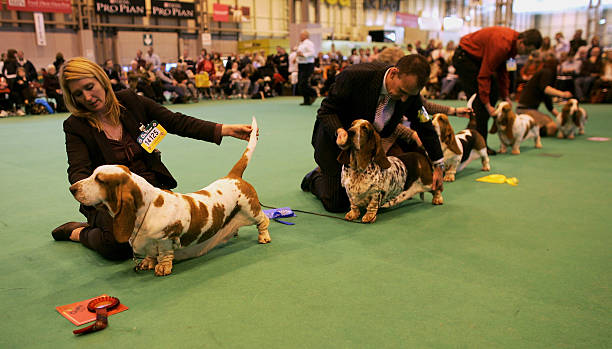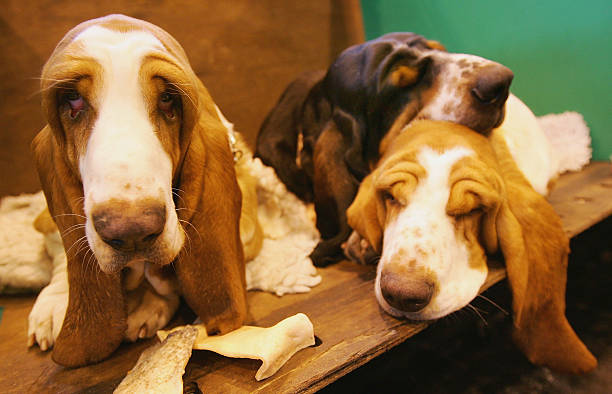
The Basset Hound is a distinctive breed known for its long ears, droopy eyes, and exceptional sense of smell. Originating in France, the word "Basset" comes from the French term "bas," meaning "low," referring to the breed’s short stature. The Basset Hound descends from the St. Hubert Hound, an ancestor of the modern Bloodhound. By the late 1500s, French monks at the Abbey of St. Hubert selectively bred these dogs to create a shorter-legged hound that could trail scents under dense underbrush, making them ideal for hunting small game like rabbits and hares.
The breed gained popularity in France and later in England for its keen nose and methodical tracking abilities. By the 19th century, the Basset Hound was imported to the United States, where it quickly captured the hearts of dog lovers for its distinctive appearance and gentle, affectionate nature. The American Kennel Club (AKC) officially recognized the breed in 1885.
The Basset Hound’s unique look, combined with its easygoing temperament, has made it one of the most beloved dog breeds worldwide. Its expressive eyes, long, velvety ears, and low-slung body give it an unmistakable appearance that appeals to people of all ages. The breed's gentle and patient demeanor makes it an excellent choice for families, singles, and seniors alike.
The Basset Hound has become a cultural icon, appearing in numerous movies, television shows, and advertisements. Its laid-back personality and comical expressions have made it a favorite in popular culture, further cementing its place as a cherished companion.
The Basset Hound is a medium-sized dog with a distinctive appearance characterized by its long ears, droopy skin, and short legs. Despite its low stature, the breed is sturdy and muscular.
Key Features:
• Coat: The Basset Hound has a short, smooth, and dense coat that lies close to the body. The coat comes in a variety of colors, including tri-color (black, white, and brown), red and white, lemon and white, and more.
• Size: Medium-sized, the Basset Hound typically weighs between 40 to 65 pounds and stands about 14 inches tall at the shoulder. Its heavy bone structure gives it a solid and substantial feel.
• Head & Expression: The breed has a large, domed head with a pronounced stop and a long, deep muzzle. Its eyes are dark and soulful, often giving a sad or pleading expression that adds to its charm.
• Ears: The Basset Hound’s most distinctive feature is its long, velvety ears, which hang low and help funnel scents toward its nose.
• Body: The Basset Hound has a long, heavy body with a deep chest and short, sturdy legs. Its loose, elastic skin forms wrinkles, especially around the face and neck.

The Basset Hound is known for its gentle, affectionate, and laid-back personality. This breed is a loyal and loving companion, making it an excellent choice for families and individuals alike.
Key Behavioral Traits:
1. Gentle and Affectionate: The Basset Hound forms strong bonds with its family members and enjoys being close to its owners. It is a loving and patient companion.
2. Laid-Back and Easygoing: This breed is known for its calm demeanor and relaxed attitude. It enjoys lounging around the house and is content with moderate exercise.
3. Stubborn but Intelligent: The Basset Hound is intelligent but can be stubborn and independent. Positive reinforcement and patience are key to successful training.
4. Playful and Sociable: While not overly energetic, the Basset Hound enjoys playtime and socializing with people and other pets. It is friendly and gets along well with children and other animals.
5. Vocal and Expressive: The Basset Hound has a deep, melodious bark and is known for its vocalizations. It may howl or bay, especially when following a scent.
If you're looking for a dog that combines a distinctive appearance with a gentle and loving personality, the Basset Hound is an excellent choice.
Reasons to Choose This Breed:
• Unique Appearance: The Basset Hound’s long ears, droopy eyes, and low-slung body give it an unmistakable look.
• Loving and Social: This breed thrives on human companionship and enjoys being part of family activities.
• Gentle and Patient: Ideal for families seeking a calm and affectionate companion.
• Moderate Exercise Needs: The Basset Hound requires moderate exercise, making it suitable for various lifestyles.
• Good with Children and Pets: The breed’s friendly and tolerant nature makes it a great addition to multi-pet households.
The Basset Hound is relatively low-maintenance but benefits from regular care to maintain its health and well-being.
Essential Care Tips:
1. Grooming: The breed’s short coat requires minimal grooming. Weekly brushing helps remove loose hair and keep the coat healthy. Regular ear cleaning is essential to prevent infections.
2. Exercise: Provide moderate opportunities for physical activity, including daily walks and playtime. The Basset Hound enjoys sniffing and exploring but should be monitored to prevent overexertion.
3. Social Interaction: The Basset Hound enjoys spending time with its family and should not be left alone for extended periods. Engage in interactive play and provide companionship to strengthen your bond.
4. Nutrition: Offer high-quality dog food to support the breed’s overall health. A balanced diet helps maintain their weight and muscular build.
5. Health Monitoring: Regular veterinary checkups are essential to monitor the Basset Hound’s health and detect any potential issues early.

While generally healthy, the Basset Hound may be prone to certain genetic conditions, particularly those related to its unique body structure. Regular veterinary care and a healthy lifestyle can help mitigate these risks.
Common Health Issues:
• Ear Infections: The breed’s long ears can trap moisture and debris, leading to infections. Regular cleaning and monitoring are essential.
• Obesity: The Basset Hound’s love of food requires careful portion control and regular exercise to prevent weight gain.
• Hip and Elbow Dysplasia: The breed’s heavy bone structure can lead to joint issues. Maintaining a healthy weight and providing joint supplements can help.
• Intervertebral Disc Disease (IVDD): The breed’s long back makes it prone to spinal issues. Avoid activities that strain the back, such as jumping from heights.
• Bloat (Gastric Dilatation-Volvulus): A life-threatening condition that requires immediate veterinary attention. Feeding smaller, frequent meals can help reduce the risk.
Compared to other hound breeds like the Bloodhound, the Basset Hound is smaller and more laid-back. While the Bloodhound is known for its intense tracking abilities and high energy, the Basset Hound is more relaxed and content with moderate exercise. Its affectionate and gentle nature makes it similar to breeds like the Beagle, but its distinctive appearance and calm demeanor set it apart.
The Basset Hound is perfect for individuals or families looking for a calm, affectionate, and low-maintenance companion. If you appreciate a dog with a unique appearance, gentle personality, and moderate exercise needs, this breed will fit right into your home. Regular grooming, ear care, and veterinary checkups will help keep the Basset Hound healthy and happy.
If you prefer a more active or highly trainable dog, other breeds might be a better fit. However, if you're seeking a loving, relaxed, and visually striking canine companion, the Basset Hound is an excellent choice.
United Pet Club is here to help you find the perfect canine companion. Whether you're looking to adopt or connect with trusted breeders, we provide valuable resources to guide you every step of the way.
Explore our platform to learn more about Basset Hound dogs, their history, and how to care for them.